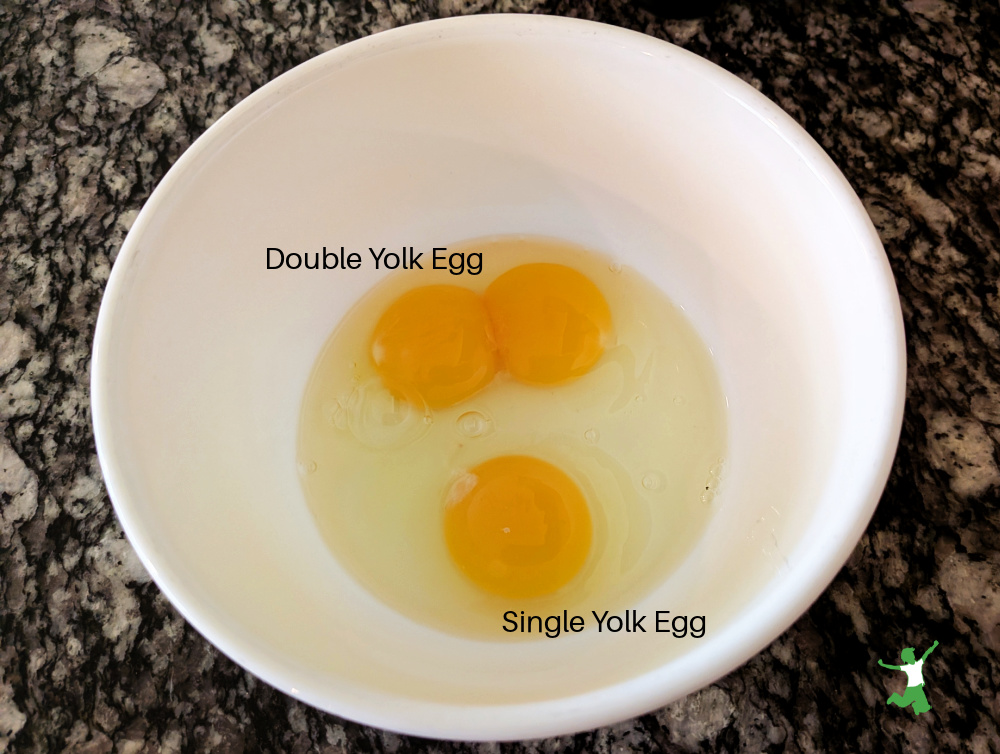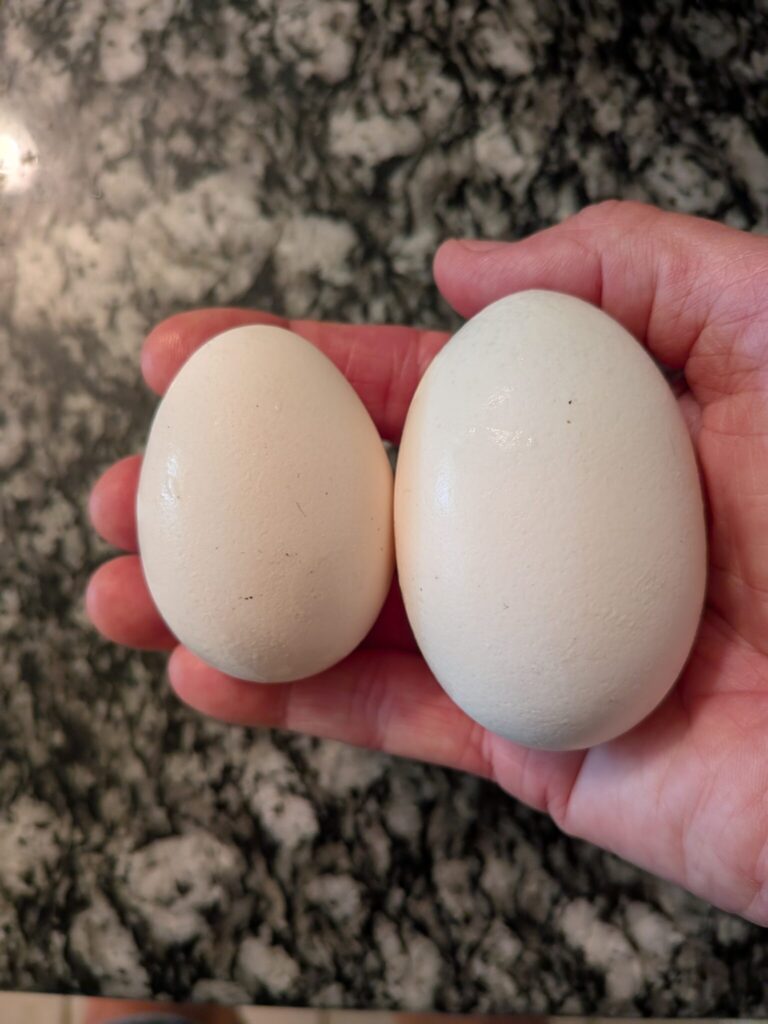The amazing phenomenon of double yolk eggs, how they compare to single yolk store eggs, and tips on getting more of these beauties from your hens!

One of the biggest benefits of keeping backyard chickens is that you get to enjoy eggs that you would rarely (if ever) come across buying organic store eggs.
Eggs you generally don’t see in cartons from the store are what’s called “double yolkers”. They are roughly the size of duck eggs!
Another example is eggs with “meat spots”.
Below is a picture of a double yolk egg that one of my newly laying White Leghorn hens gifted us recently.
Note the size of the double yolker compared to a single yolk egg.
These two eggs were laid by the same young hen!
I really hit the jackpot with this sweet bird ❤️
As you can see from the picture above, each yolk in the double egg is roughly the same size as the yolk in the single egg.
Since the yolk is the most nutritious part of an egg (can you believe some folks still throw them out?), you really do get “two for the price of one”.

While I am fortunate to have a hen that is only six months old laying double yolkers, these beauties typically come from older hens.
This is why you don’t see double yolk eggs in the store from industrialized farms even if organically certified.
Hens from mass production farms are normally culled for meat after only a year or so….as soon as their egg production starts to drop or their first molt, whichever comes first, according to what I’ve been told by those in the industry.
The commercial egg industry also prefers eggs from young hens (under a year and a half old) as this ensures uniformity of size for packing/shipping in egg cartons.
Eggs get larger in size with the age of the hen in my experience. Hence, the propensity for double yolk eggs from older birds.
If you’ve never seen double yolk eggs before, why not?
Are you still supporting the industrial food complex by purchasing eggs at the store?
Note that store eggs, even if organic, may be weeks old (or months old if partially frozen in storage) by the time you buy them. In addition, they are washed with undesirable chemicals as this is required in the United States.
Because eggshells are porous, some of this is no doubt getting into the eggs!
Read more details about the scam of organic store eggs and organic egg washing practices at the provided links.
Contrary to popular belief, a nutritious egg is not all about the yolk color, because this can easily be manipulated with feed to fool the consumer if the hens aren’t truly pastured.
I recommend getting your eggs from one of the sources below to ensure legit yolk color and to avoid the toxic practices that are allowed under USDA Organic for mass production facilities.
- Your own backyard coop (best)
- A neighbor
- Farmer’s market
- Independently owned health food stores that source from local egg farms.
You don’t need any double blind studies to see and taste the difference.
Your five senses will do just fine, thank you!








I was out of my farmer’s eggs so I picked some up at Safeway (Organic “free range”). I made scrambled eggs this afternoon for my 3 year-old and he said, “Mom, why are these eggs white?” Even a 3 year-old can tell the difference between farm fresh eggs and store bought ones!
We had double yolk eggs for three weeks straight, and we eat at least 3 – 4 eggs per day in our house. I was bummed when I cracked an egg open and it only had one yolk.
I get eggs from my parents’ farm and we will get double yolks occasionally. It’s always such a surprise! There’s a huge difference between store bought and farm fresh free range chicken eggs, in taste and performance in dishes.
Sarah, I would like to discuss with you regarding your coordinating buying clubs for your area as I would like to start this up in an area of my state that has no health food stores but seems to be a huge interest for buying choices of the most healthy foods. How can we connect?
Hi Sher, just email me at thehealthyhomeeconomist.com
I have a similar experience. I get my raw milk from my local diary farmer and he recently started selling eggs. My! They’re the best I have ever tasted. The yolks are a rich yellow color and they’re huge. I have been buying organic eggs for years and they pale in comparison.
I’d love to do farm fresh eggs, if there was a way to know which are fertile and which aren’t. Is there an EFFICIENT way to tell the difference?
If there’s a rooster with the hens, they’re probably all fertile (unless the ratio of hens:rooster is very high). If there’s no rooster, then none are fertile 😀 Though most chicken farmers keep roosters in their flocks, not everyone who raises chickens does – We only have hens, since we live in a subdivision, so none of our eggs are fertile. We don’t have enough extra eggs to sell at a market, but we sell them to co-workers for $2 a dozen. Maybe you can find a friend who only keeps hens.
If there is a chance, but not a certainty that the eggs are fertile, there’s really no way to be 100% sure if the eggs are fertile without incubating them, and then you couldn’t eat them! (Actually, you can sometimes see a very small, faint circle with a tiny dot in the middle on the yolk of a fertilized egg, but not always, and you have to break the egg – obviously that’s not very efficient either.) But fertile eggs don’t look or taste any different or have any different nutritional content from non-fertile eggs. (I know this for sure because we had a rooster for a while, but he was too big and noisy, so we gave him to the farmer we get our milk from.)
Thanks Audry, Looking for someone with hens only may be a good option.
If fertile eggs were limited to a ‘tiny’ dot, it probably wouldn’t be too big of a deal, but some of the eggs I’ve come across had more of a ‘dot’ than this ‘city boy’ could handle. Not sure why I’m able to rip a chicken leg right off and eat it, but can’t handle fertile eggs.
Yes, sometimes the white even gets a little bloody.
Ah, yeah that can happen if the fertile eggs aren’t collected quickly enough… if that was happening a lot, I wonder if just finding a different farmer (who maybe picks up the eggs more frequently) would help. You can occasionally get blood spots in non-fertile eggs too, but not like a fertilized egg that’s been sat on for a few hours… :-
Definitely can be a challenge when the chickens are free ranging around and the eggs are sometimes “lost”.
the yolk is where all the nutrition – including cholesterol – and all the flavor is!
why would I want a double yolk egg though? isn’t that where all the cholesterol is too? don’t get me wrong, I don’t usually go for all whites, but I’m curious
Sorry! The “Too funny” was supposed to go on the “dentist” post…
I’m not sure what to think about double yolked eggs. Doesn’t seem normal to me.
The problem with getting eggs from farmers around here is that they are all brown eggs and they do not have the same taste as white eggs. The other problem is that my husband has an autoimmune disease and he doesn’t like eating anything that isn’t pasturized. He’s afraid of the bacteria. Can’t say that I blame him. I know that I will not be agreed with on that.
The way I look at it , if a chicken is free to roam and eat and do what a chicken does and naturally produces a bunch of double yolk eggs, this sure seems normal.
I wonder if folks consider double yolks abnormal just because store eggs rarely if ever have them? Abnormal becomes the norm in that case kind of like kids with allergies are the norm nowadays although this used to be abnormal just a couple decades ago.
I don’t see my daughter’s food allergies as normal at all. My husband has autoimmune problems and she inherited the tendancy. Somewhere something triggered them. If I had known what it was I sure would have done what I could to prevent it.
Too funny!